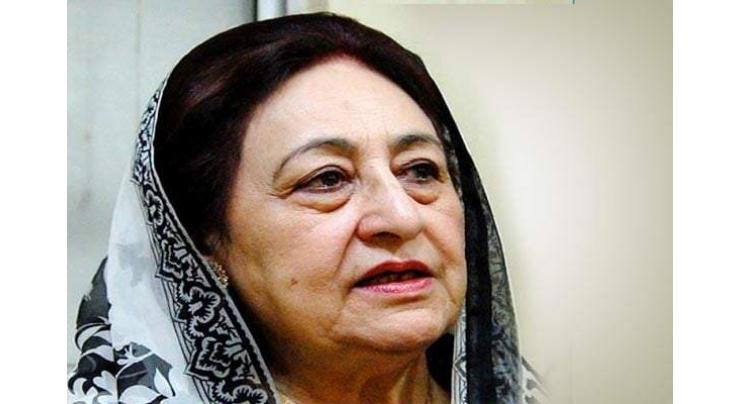
- Home
- Pakistan
- News
- OOSC ratio declines amid 6.4 mln children, 57 million adults illiterate: Razina Alam
OOSC Ratio Declines Amid 6.4 Mln Children, 57 Million Adults Illiterate: Razina Alam
Rukhshan Mir (@rukhshanmir) Published August 17, 2018 | 05:11 PM

National Commission for Human Development (NCHD), Chairperson former senator, Razina Alam Khan said out of school children (OOSC) number has decreased from 26 million to 22.6 million while 6.4 million children and 57 million adults are still illiterate.
ISLAMABAD, (UrduPoint / Pakistan Point News - 17th Aug, 2018 ) :National Commission for Human Development (NCHD), Chairperson former senator, Razina Alam Khan said out of school children (OOSC) number has decreased from 26 million to 22.6 million while 6.4 million children and 57 million adults are still illiterate.
Talking to APP here on Friday, she said it is encouraging that a number of positive developments have been undertaken in formal system of education and as a result number of OOSC ratio has declined.
Despite all these efforts, she said millions of children of age cohort 9-14 and adults were illiterate and was a major reason of low literacy rate of the country which could not be addressed through formal education system.
"There is a dire need to adopt a proactive, vibrant and a dynamic approach to provide education to these unreached masses, through Non-formal Education (NFE)", she said.
Razina informed that Non-formal education strategy is more suitable to access to this marginalized group and to achieve the targets of vision 2025 and SDGs in minimum possible time.
NCHD adopted two pronged approach i.e. curbing the annual increase in the illiterate pool by ensuring that all children get enrolled and do not drop out before completing Primary education. On the other hand NCHD deals with the back-log of adult illiterates by implementing functional literacy program countrywide, she added.
While commenting on enrollment drive, she said NCHD remained busy in enrollment campaign during this quarter while a number of activities were carried out. American Refugee Council (ARC) was an additional partner for enrollment campaign in Punjab and Balochistan, she said.
"By the collaborative efforts, NCHD was able to conduct 100 percent baseline survey in selected 1150 locations of seven districts of Punjab. ARC supported in monitoring of enrollment campaign activities", chairperson said.
She said the commission has constituted Advisory Council for literacy and a forum on NFE, whose meetings, are conducted on quarterly basis. The 6th meeting of Advisory Council was held in the beginning of May and a meeting of the forum on Non-formal Education was arranged in the last week which remained very fruitful, she added.
She expressed her gratitude while sharing that NCHD had successfully launched its National Training Institute for literacy and NFE officially in the mid of May. It is 100 percent operational now and all the stakeholders working in the field of literacy and NFE are invited to utilize its services, she opined.
"I am also thankful to Ministry of Federal Education and Professional Training, Planning Commission and all the stakeholders for their support in establishing this NTI", she said.
Functional Literacy centres are at their completion stage and our new approach to introduce vocational technical skills along with literacy skills was very beneficial for the Program as well as for the learners, she observed.
"It has been observed that interest of the learners was boosted and dropout ratio turned zero in this phase. On the other hand community members especially women have been empowered by these vocational and technical skills which helped them to earn some extra income", she said.
Chairperson said NCHD achieved its daunting tasks just because of untiring efforts of its employees and would like to congratulate them all on revision of their grades. It was an uphill and historic task as 2,641 employees were up graded, she said.
She was optimistic that by the collaborative efforts of all the stakeholders and adopting Non-formal Education system in the country, Pakistan will be able to achieve the educational targets of Vision 2025 and SDGs.
Recent Stories

Govt likely to hike electricity price once again

Bismah Maroof announces immediate retirement from international cricket

Malala expresses unwavering support for Gaza people

Selection committee dissolved over Pakistan women cricket team's poor performanc ..

Punjab CM Maryam Nawaz in police uniform at Chung police center

Currency Rate In Pakistan - Dollar, Euro, Pound, Riyal Rates On 25 April 2024

Today Gold Rate in Pakistan 25 April 2024

Mired in crisis, Boeing reports another loss

Session Awarding Ceremony 2024 held at Cadet College Muzaffarabad

Austrian ski great Hirscher to make comeback under Dutch flag

Pakistan, Japan agrees to convene 'Economic Policy Dialogue'

FM Dar conveys deepest sympathy on torrential rains devastation in UAE
More Stories From Pakistan
-
Provincial Ombudsman Secretariat is determined to address public complaints
5 minutes ago -
277 training sessions held for livestock farmers
15 minutes ago -
24 criminals held
15 minutes ago -
Ombudsman’s Dera office dispose of 207 complaints at South Waziristan
25 minutes ago -
Various food points fined over violations:
25 minutes ago -
PM for political commitment, adequate investment to achive goal of malaria-free world
45 minutes ago
-

Malala expresses unwavering support for Gaza people
55 minutes ago -
President stresses joint efforts to control Malaria
55 minutes ago -
Karachi Police arrest four suspects in crackdown on street crime
55 minutes ago -
IRSA releases 163,300 cusecs water
55 minutes ago -
Global tributes to kashmiri icon Amanullah Khan on 8th death anniversary
1 hour ago -
Payment of 100 pc pension to widows of non PUGF employees of TMA demanded
1 hour ago
